Japanese Personnel Playing Active Roles in International Organizations across the World
—Voices from Japanese staff members working on vaccine roll-outs, food assistance, health and medical care services, and protection of children and vulnerable people around the world—
Ms. KITAJIMA Chika
Senior Manager of Resource Mobilization, Gavi, the Vaccine Alliance
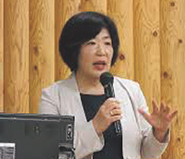
Vaccines are the most promising way to overcome the COVID-19 pandemic. Gavi, the Vaccine Alliance is a public-private partnership leading the COVAX Facility, a mechanism designed to rapidly develop safe and effective COVID-19 vaccines and deliver them to people across the world. As the senior manager of resource mobilization, I am in charge of fundraising for Gavi’s activities. These activities previously focused on vaccinations for children in the world’s poorest countries. However, we have expanded the scope of our activities and support due to COVID-19. The COVAX Facility is the only mechanism in the world that delivers vaccines in a fair and equitable manner to people who need them the most, regardless of whether they are from developing or developed countries, and over 180 countries and regions have participated with the objective of procuring and supplying two billion vaccine shots by the end of 2021. Since the probability of success in developing new vaccines is not necessarily high, the Facility also serves as an “insurance” for securing vaccines by supporting the development and manufacture of a variety of vaccines. The Japanese government has been a major donor country of Gavi since 2011, and is helping to encourage other countries to participate in supporting the COVAX Facility by being the first to announce its participation.
See the Glossary on page 67 regarding Gavi, the Vaccine Alliance and the COVAX Facility.
Ms. FUJII Akiko
Resident Representative in the Maldives, United Nations Development Programme (UNDP)
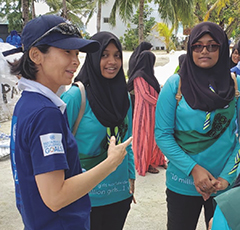
The Maldives—a land of everlasting summer. It never ceases to attract tourists from all over the world. However, far away from the luxury resorts, ordinary people’s lives on the local islands have been badly affected by the COVID-19 pandemic as the country’s economy mostly depends on tourism. Many people lost their jobs or experienced a reduction in income when the border was closed between March 27 and July 15, 2020, and tourism revenue fell to virtually zero. According to a study carried out by the UNDP and the Ministry of Economic Development, the COVID-19 pandemic hit the younger generation the hardest, a group whose unemployment rate was already high. In the capital city of Malé, where 150,000 people are packed onto two square kilometers of land, the infection spread quickly, and some food imports were disrupted. The COVID-19 crisis revealed the vulnerability of the small island nation.
Through the support of the Japanese government, UNDP swiftly initiated a project to assist the recovery of smallholder farmers and micro enterprises, targeting young people and women who had lost their jobs due to the COVID-19 pandemic. We assisted in the development of urban vegetable gardens as part of Hulhumalé city’s smart city initiatives, while in Laamu Atoll, where there is a relatively large amount of farming land available, the project promoted agri-business. The Maldives’ first co-shared kitchen has also been developed to support women who lack the initial funding to start a business. ‘Build Forward Better’—the concept of making the living environment better than it was before the COVID-19 pandemic—is the key to recovery. On your next vacation to the Maldives, why don’t you visit the local islands and try some homemade dishes that make use of local vegetables?
Mr. HIBI Yukinori
Head of Programme, United Nations World Food Programme (WFP) Libya Office in Tripoli
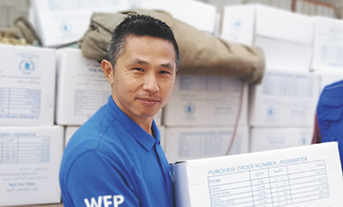
Since September 2018, I have been responsible for programs in Libya as the Head of Programme in WFP Libya. Due to the worsening security situation in the country, I spent the first three months of this assignment working remotely in the neighboring country of Tunisia. Then, from April to November 2020, I went back to Japan temporarily because of COVID-19 and continued to work remotely from my home there, adjusting to local working hours in Libya, which are seven hours behind Japan. As of December 2020, I am back working at the Libya Office.
In this country of almost seven million people, there are still about 900,000 people who require humanitarian assistance. The impact of COVID-19 has made it difficult to run operations, while at the same time almost doubling the number of people requiring food assistance. WFP Libya is currently facing these difficulties head on to provide support to over 200,000 people. We are ensuring that stringent measures against infection are being implemented at every worksite. As an example, since schools are closed due to COVID-19, we changed on-site school feeding for approximately 20,000 children to take-home ration distributions, and continue to provide nutritionally balanced meals to students. By leveraging my experience in running projects remotely, the use of technology, and the expertise of my colleagues, I am forging ahead with these new initiatives.
Ms. SAWAYA Natsuko
Public Health Officer, International Organization for Migration (IOM) Niger
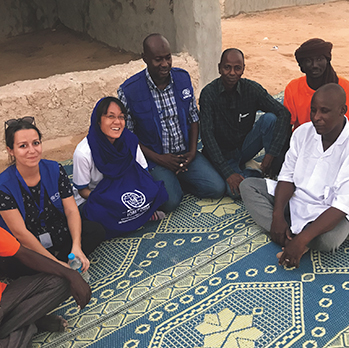
Niger’s borders were closed in the middle of March 2020 to limit the spread of infection of COVID-19. This meant that we had to help people from West African countries stranded at our transit centers in Niamey, the capital, and the Agadez Region return home to their native countries, as well as support the lives of migrants during quarantine, including Nigeriens repatriated from Algeria. I am participating in the national monitoring committee for COVID-19 in Niger as a member of IOM, and I work hard day after day to support those people, together with the government and other partners, including international organizations such as WHO.
Meanwhile, a state of emergency has been declared in regions including Tillabéri due to flooding and terrorism, which has displaced a large number of people both inside and outside the country. We have therefore been helping to provide shelters and health and medical services with assistance received from Japan, while taking into consideration the situation of each affected person, such as pregnant women and children, who are among the most vulnerable. I am working hard with the sincere hope that our support will have positive outcomes, and that each person will one day be able to deal with these difficulties by themselves.
Dr. KITAMURA Tomomi
Doctor, United Nations Children’s Fund (UNICEF) Middle East and North Africa Regional Office in Jordan
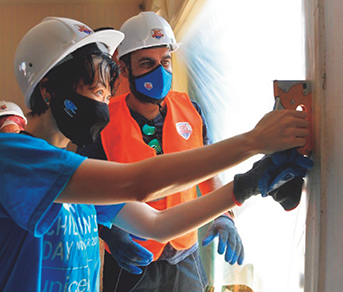
The UNICEF Middle East and North Africa Regional Office is based in Amman, the capital of Jordan, and undertakes the management and evaluation, technical support, and information sharing of 16 Country Offices and their regional activities. As for support related to COVID-19, the Health and Nutrition section where I belong works with the Country Offices on infection prevention and control, procurement of medicine and medical equipment, strengthening communication, and the continual provision of health and nutrition services to women and children.
As measures against COVID-19, our office is working together with five organizations, including the World Health Organization (WHO), to create an online training program for primary health care workers. We also hold online meetings in cooperation with WHO and the United Nations Population Fund (UNFPA) to discuss, together with health ministers of nine countries with high child and maternal mortality rates, how to maintain the provision of health and nutrition services to women and children during the COVID-19 crisis. We regularly hold discussions with health ministries and other international organizations on promoting this kind of collaboration within the region. The Regional Office may not carry out a large number of field activities. However, I hope that we can engage in activities that take advantage of our strength of being involved in the entire region.
Ms. YOSHIKAWA Miho
Child Protection Specialist, United Nations Children’s Fund (UNICEF) Cambodia
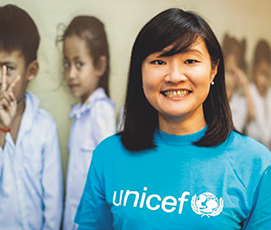
Since May 2016, I have been working for UNICEF as a Child Protection Specialist in Cambodia, Southeast Asia. My role mainly involves the development, implementation, monitoring, and reporting of various programs/projects to protect children from violence, abuse, and exploitation. In 2020, UNICEF Cambodia focused its work on protecting children affected by COVID-19.
With support from Japan, UNICEF Cambodia has implemented a wide range of initiatives in the areas of health, water, hygiene and sanitation, child protection, education, and communications to prevent the spread of COVID-19 and address its socioeconomic impacts. In the child protection sector in particular, UNICEF Cambodia has been proactively working to create an environment in which every child can continue to access social welfare and child protection services, including mental health and psychosocial support, in close partnership with the Cambodian Ministry of Social Affairs, Veterans and Youth Rehabilitation, as well as NGOs. As a staff member at UNICEF, I would like to further contribute to ensuring that as many children across the world as possible can live their lives safely and fully enjoy their childhood.
